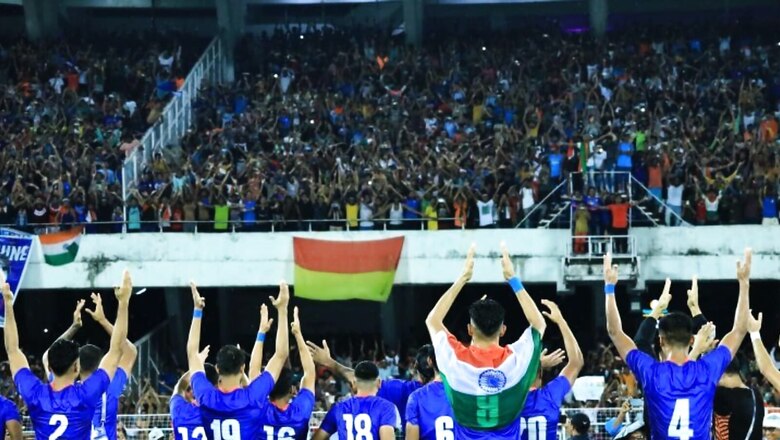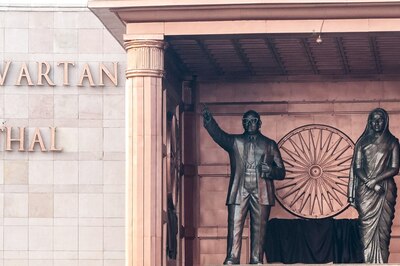
views
Indian football saw a sea of change as the nation waded through troubled waters to usher in a new dawn of endless possibilities for the beautiful game and bring hopes of reaching the promised land of ‘success’.
2021 started with India hosting the AFC Women’s Asian Cup, as the national team was forced to withdraw from the competition due to players and staff contacting Covid-19, after their opening goalless draw against Iran. Their last two group games were forfeited and host India bowed out due to off-field negligence.
Jamshedpur FC and Hyderabad FC emerged champions of the League winner’s and Indian Super league trophies, respectively as Gokulam Kerala FC defended their I-League and the Indian Women’s League title.
Mumbai City FC made India proud at the AFC Champions League, registering two wins (over Air Sports Club Iraq) in the group stage. In the AFC Cup, Gokulam Kerala shocked ATK Mohun Bagan in the opening game but the latter qualified from the group with successive wins and a better goal difference. But in the next round, ATKMB surprisingly lost to Malaysia’s Kuala Lumpur City FC in the AFC Cup Inter-Zonal Semi-Finals.
The Durand Cup had all 11 ISL sides taking part, for the first time, with matches being held in Kolkata’s Vivekananda Yuba Bharati Krirangan and Kishore Bharati Krirangan in Kolkata, as well as Guwahati’s Indira Gandhi Athletic Stadium and Imphal’s Khuman Lampak stadium.
In the knockouts, two I-League clubs qualified along with six ISL teams, as Mohammedan SC, Hyderabad FC, Bengaluru FC and Mumbai City FC made the semis. Bengaluru FC defeated Mumbai City FC in the final, to win their maiden Durand Cup title as Sunil Chhetri completed his set of winning all major Indian football trophies.
The Santosh Trophy returned with all its glory in Mallapuram as hosts Kerala defeated Bengal on penalties, in front of a sold-out crowd, to lift their seventh national title.
The men’s football team booked their place in the AFC Asian Cup, with wins over Hong Kong, Afghanistan and Cambodia at a packed Saltlake Stadium in Kolkata.
The Indian women’s football team returned to action later in the year, only to fail to qualify for the final of the 2022 SAFF Women’s Champions.
India had success in age-group football, winning the SAFF U-18 Women’s Championship in Jamshedpur, the SAFF U-20 Men’s Championship in Bhubaneshwar as well as the SAFF U-17 Men’s Championship in Sri Lanka.
In the AFC U-17 Asian Cup Qualifiers, India defeated Maldives (5-0), Kuwait (3-0) and Myanmar (4-1), but lost to hosts Saudi Arabia (1-2) in the group stage. India did manage to qualify though for the finals as one of the six best second-placed teams.
The U-20 team was not as lucky as they lost to Iraq (4-2) and Australia (4-1) but ended their AFC Asian Cup qualifiers on a positive note with a 2-1 win over Kuwait.
Then came the marquee event, the 2022 FIFA U-17 Women’s World Cup, albeit after some ‘difficulty’. India were outclassed by USA 8-0, then lost 0-3 to Morocco and ended their humiliating campaign 0-5 to Brazil.
For age-category club tournaments, Bengaluru FC and Kerala Blasters emerged champions and runners-up to qualify for the Next Gen Cup finals in the United Kingdom, where they impressed but could not produce favourable results against the likes of Tottenham Hotspurs, Leicester City, Nottingham Forrest, West Ham and Crystal Palace.
In one of the darkest days in Indian football, the International Federation of Association Football (FIFA) suspended the All India Football Federation (AIFF) on August 16, citing “undue influence from third parties.”
It was a culmination of nearly three months of turmoil, ever since the Supreme Court of India appointed a Committee of Administrators (CoA) to oversee the functioning of the AIFF while relieving Praful Patel and his executive committee from their responsibilities. Patel completed his three terms and 12 years as AIFF president in December 2020, the maximum permitted to a national sports federation chief under the Sports Code. Elections should have taken place to elect a new president but polls weren’t carried out because of pending cases in the Supreme Court regarding its constitution.
AIFF members, including state bodies, opposed changes suggested in the football bodies’ constitution by the CoA – Justice (retired) Anil R Dave, former Chief Election Commissioner of India, Dr SY Quraishi and former India captain Bhaskar Ganguly.
After numerous back and forths, including discussions with AFC and FIFA delegates, the Supreme Court disbanded the COA and on 25th August, FIFA officially lifted its suspension on AIFF.
In September AIFF held its Presidential Elections as Kalyan Chaubey became the first former player to hold the top office in the board’s 85-year-old existence. Chaubey, a BJP leader from West Bengal and former goalkeeper, defeated Indian football legend Bhaichung Bhutia, by a margin of 33-1.
With the FIFA ban lifted and a new AIFF governing body in place, India was cleared to host the Women’s U-17 World Cup.
The Kalyan Chaubey-led AIFF decided to pull out from the race of hosting the 2027 AFC Asian Cup, and had earlier signed a Memorandum of Understanding (MoU) with Saudi Arabia to host the knock-out stages of the Santosh Trophy in Jeddah or Riyadh for three years.
AIFF’s new executive committee took the decision that I-League winners will be promoted to the ISL, subject to fulfilling the club licensing criteria, as well as have a second division league, that has 15 teams from across the country, plus the reserve teams from the ISL and I-League teams, with the final rounds being played on a home-away basis.
The U-17 Youth Cup also started with a total of 50 teams from 29 States/Union Territories, being divided into 10 groups and 10 locations. The 10 group winners and six best second-placed teams will qualify for the Final Rounds.
Despite the challenges and hurdles, Indian football is expected to bounce back ever stronger in the coming years, starting with the announcement of a roadmap for the next 25 years on January 7th of 2023.



















Comments
0 comment